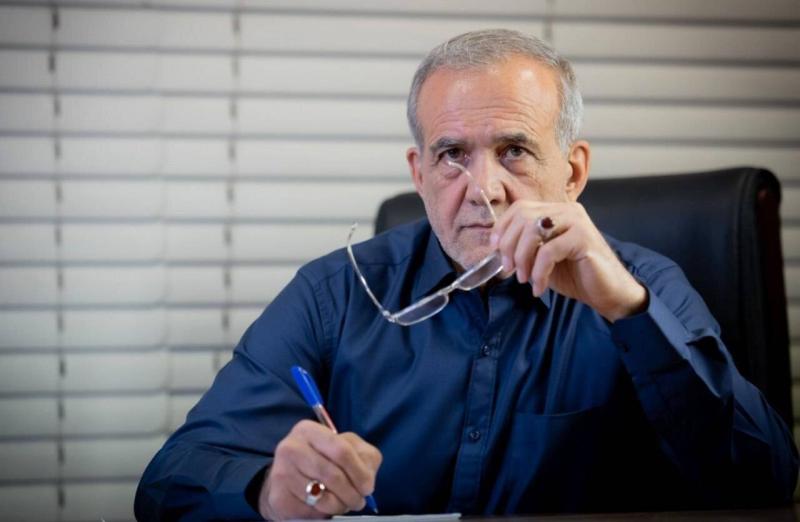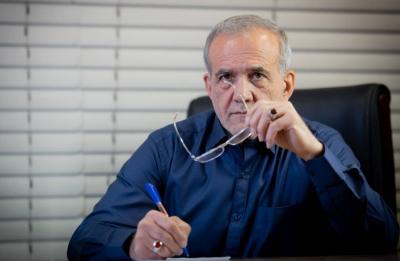In an analysis by CNN's senior analyst Fareed Zakaria, the election of Iran's new president, Masoud Beizhehkhian, is a significant step in the long journey toward Iran's normalization within the international community. Beizhehkhian opposed the rigid conservative approach in Iran, which conflicts with the aspirations of younger generations that have lost their trust and connection with the state. The death of young Mahsa Amini at the hands of the morality police for not fully covering her hair spurred Beizhehkhian to launch a harsh campaign against the behavior of clergymen and the state institutions they control. He has been supported in this by his predecessor Mohamed Khatami and former Foreign Minister Mohammad Javad Zarif.
The elected president is reportedly aligned with Khatami's approach, which established good relations with regional countries and sought to alleviate tensions and grievances. Although the Iranian president is elected by the people, the candidates for the position are nominated by the Guardian Council, composed of 12 members appointed by the Supreme Leader. Therefore, the elected president is indebted from the first day of their election to the Supreme Leader, whose opinions, directives, and wishes are to be followed obediently.
Supreme Leader Ali Khamenei has confined foreign policy and the guidance of the "Revolutionary Guard" and Iran's extended arms to himself exclusively, limiting the president's ability to effect radical changes in the approach followed by Khamenei for over 35 years. Rather than being a beacon of change in Iran, Beizhehkhian's role will be defined by his steadfast loyalty to the Supreme Leader and the regime's policies. He mentioned, "We will not present new policies because the Supreme Leader's policies are clear." His loyalty to the Supreme Leader and the current situation is not merely political; it is also personal for Beizhehkhian, who stated, "I believe in the Supreme Leader. I love him." He also expresses admiration for everything the Supreme Leader loves, such as his praise for the late Qassem Soleimani, the former commander of the Quds Force, which bolsters his credentials domestically. Thus, his proclamation: "Commander Soleimani was the pride of Iran!"
U.S. State Department spokesperson Matthew Miller has indicated that the U.S. does not have high hopes for a change in Iranian policy following the election of President Masoud Beizhehkhian, with similar sentiments echoed from the White House. However, there has already been a public return to negotiations over the Iranian nuclear agreement, as Adil Araghji from the Foreign Ministry confirms the continuation of U.S.-Iran nuclear negotiations in Oman’s capital, Muscat.
Beizhehkhian addressed the United States, affirming his country's "refusal to succumb to pressure," adding that Iran "entered the Joint Comprehensive Plan of Action in 2015 in good faith and fulfilled (its obligations fully)." He mentioned that the U.S. withdrawal caused "hundreds of billions of dollars in damage to our economy," leading to "incomprehensible suffering, death, and destruction for the Iranian people—especially during the COVID pandemic," and due to sanctions. He accused European nations of abandoning the commitments they made after the U.S. withdrawal to ensure "effective banking transactions, full protection for companies from U.S. sanctions, and enhancing investments in Iran." Nonetheless, he added that there remain many opportunities for cooperation between Iran and Europe. This indicates that Beizhehkhian recognizes the West's necessity for Iran's return to the world.
The Supreme Leader is also aware that his country's situation is not favorable, understanding well that reality contradicts the propaganda disseminated by regime outlets. Citizens suffer from exorbitant prices and a lack of prospects, as the state struggles to provide social security due to sanctions and frozen funds. On the other hand, the Iranian expansion through its proxies has reached a magnitude that Iran is no longer capable of bearing or justifying, while many of its people languish below the poverty line, questioning what benefits the proxies have brought to improve their situation and end their suffering.
Moreover, the Supreme Leader knows that mobilizing the "Revolutionary Guard" in Syria with thousands of affiliated militiamen from "Fatimiyun," "Zainabiyoun," "Asa'ib Ahl al-Haq," and "Abbas Forces," alongside "Hezbollah," has become a predicament. They are exposed and within range of Israeli airstrikes and drones, with over 800 of them killed since "the flood of Al-Aqsa," including first-tier commanders in the "Revolutionary Guard," and the only available response is through missiles. Even the most significant Iranian base in Lebanon under "Hezbollah" faces relentless Israeli strikes, becoming limited in scope while entire villages in southern Lebanon are destroyed, displacing tens of thousands without shelter or care. As of now, the economic losses caused by Hezbollah's support for Gaza remain unknown.
For all these reasons, reports suggest the Supreme Leader intends to finalize an agreement with the United States while he is still alive, indicating this is why he supported the election of "reformer" Masoud Beizhehkhian, who can alone reach an agreement with the Americans, backed by the trusted Mohammad Javad Zarif.




